News in 2020

|
FIG Working (from home) Week - your front row seat
4 May 2020
How much were we looking forward to welcoming you in at the FIG
Working Week Amsterdam from 10-14 May, the capital city of the
Netherlands, a vibrant city surrounded by the colourful tulip fields.
The grand opening and the plenary speakers would have set the scene
for the theme ‘Smart Surveyors for Land & Water Management’. The technical
programme was filled to the rim with interesting papers on the
latest research, projects and products. And there were plenty of options
to network, share experiences and to take part in technical
tours.
Due to the COVID-19
pandemic all this changed. The travel restrictions and government
measurements keep us close to home. The authors and presenters do not
have the opportunity, after all their preparations to write and submit a
paper, to share and discuss their contributions in a face to face
setting. And we have to find other solutions to stay connected and get
inspired.
From 10-14 May we will bring the valuable contributions of
the FIG Working Week to you. Giving you the opportunity of a
front-row seat from the distance. With a range of articles we will
highlight for you the hot-topics, the ground breaking research, and the
hidden gems. The articles are linked to the FIG commissions and the 3
subthemes of the event. Each day of the Working Week you will receive a
newsletter to give you access to new articles.
The articles are prepared in a joint effort by FIG, GIM and the Local
Organising Committee of FIG Working Week 2020. We hope that you are looking forward to reading the
articles and to get inspired and stay connected to the FIG and the FIG
surveying community.

During the days of the Working Week 2020 FIG and GIM
Magazine will publish newsletters with articles that
will guide you through the technical programme. Look
out for the newsletters. If you do not already
subscribe to GIM Magazine, you are encouraged to sign
up now
Read the articles
You can get the articles:
Sneak Peek to the Working (from home) Week
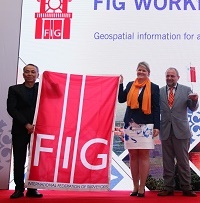 |
FIG Working Week” – what is that? A strange name
for a conference, but a name that has become close to
a trademark and is significant for the many varied
activities that are going on during the – almost -
week-long event. Since 1878, where FIG was established
and gave surveyors the possibility to meet and
network, the yearly FIG Conference has proven to be a
unique meeting place for surveyors and geospatial
experts around the world. But does it really matter to
attend a conference, and to meet?
Read the article.
|
|
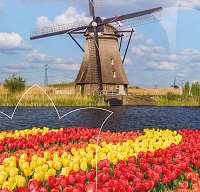 |
The tulips have been our signature symbol for the
FIG Working Week in Amsterdam in 2020. Wherever
possible we included our national symbol; in the
logo of FIG2020, in our images and of course with
the orange stickers on the badges. The timing
of the Working Week would have allowed you to visit
the flower field, or to buy Tulip bulbs in any
colour you would have liked and to plant them for
the years to come as a memory to FIG2020.
Read the article.
|
|
 |
Who could ever have imagined that GIM
International would publish a summary of a FIG Working
Week 2020 that never took place? The planned location
was Amsterdam, but the coronavirus outbreak and
coupled lockdown resulted in the situation we are in
now. FIG and GIM International therefore decided to
join forces to make the most out of all the effort
that had been put into making this year’s Working Week
a great success.
Read the article.
|
|
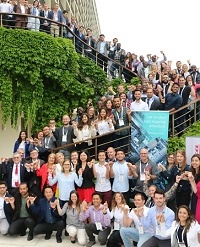 |
With geospatial information being more
important now than ever, location-based data is the
key to solving the societal challenges of our time.
Young geospatial and surveying professionals
especially sit in the driving seats towards the goal
of meeting the most urgent global and local challenges
with location-based information and analyses. But we
cannot do it alone. Resilience, collaboration and
global networks are the key to unlocking our
sustainable common future. The FIG Young Surveyors
Networks provides a platform for young geo-spatial
professionals from all over the globe to share, learn,
network and take action,
Read the article.
|
|
|
In the true spirit of global partnerships, the
Young Surveyors around the globe gathered digitally
and took up the challenge to organize the ‘5YSC Social
Distancing Edition’ in 4 different time zones;
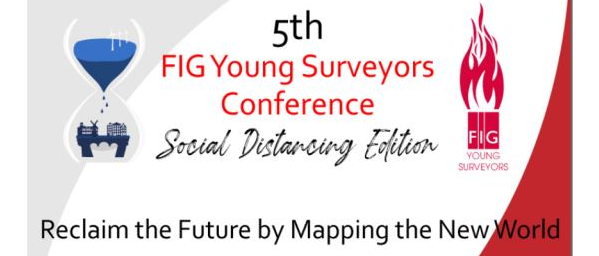
|

Welcome from FIG President Rudolf Staiger
Now we are here…
Normally, a city and conference venue would be
buzzing with surveyors and geospatial experts from all
over the world, excited to meet (again) and we would
all be eager to get started.
The FIG Fanfare should have marked the opening of
the Working Week and the General Assembly.
Today, as we are not able to meet, we are happy to
share this newsletter with you. Included here, please
find a Welcome article by FIG President Rudolf Staiger that
might give you an impression that the FIG Working Week
has started, however in a different way than normal.
Included is also the Presidents Report.
But first and foremost, please join us in this
short video welcome address from FIG President Rudolf
Staiger:
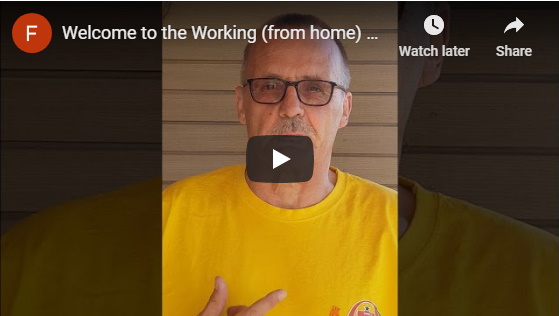
Please also look forward to the newsletter and
articles that will be sent to you during the following
4 days.
|
|
|
|
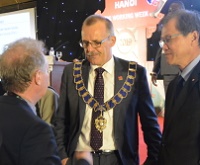
Rudolf Staiger, FIG President
|
Until the
beginning of March 2020, LOC and FIG-Council were
quite optimistic regarding the organization of the
Working Week in May. Once the global lockdown started,
it became more and more obvious that a normal
organisation will not be possible. Some of our
registered participants, who had already paid the
registration fees, contacted the FIG Office and asked
impatiently for a cancellation. At Mid-March it was in
principle clear that the Working Week will not take
place.
Read the article.
|
|
|
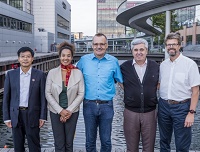
FIG Council
|
This is the first report from FIG Council for the
period 2019-2022. Under normal circumstances it would
have been presented at the first General Assembly
during the Working Week 2020.
The year 2019 was not only the start of my presidency;
it was also the induction of two new Vice presidents
namely Jixiang Zhang (China) and Diane Dumashie (UK)
and at the same time the start for ten new Commission
Chairs.
Read the report.
|
|
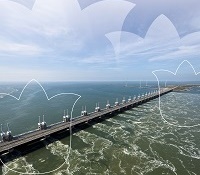 |
Did you know the proceedings are already
available? The 80 sessions offer many different and interesting topics
covering the entire broadness of the surveying
profession.
From Cadaster and Land Administration over
Hydrography, Crowdsourcing and VGI to Valuation and
Real Estate and much more… Hence, there is something
for everyone!
Check the proceedings
|
|
|
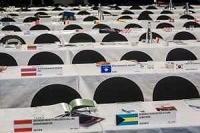
FIG is administered by its General Assembly –
delegates of the
member associations and non-voting members –
who meet annually during the FIG Working Week/Congress. The General Assembly debates and
approves policies
|
FIG Council has decided that there will
be no General Assembly in 2020. Instead,
votings and decisions will bepostponed to 2021 in the Netherlands. The agenda of the General Assembly
2020 is already published and includes reports on the FIG activities.
We encourage you to read the agenda and these reports, and through
this stay updated on what is happening in our
Federation and what FIG Commissions, Networks Task
Forces and other active FIG individuals and groups are
working on.
Agenda
|
|
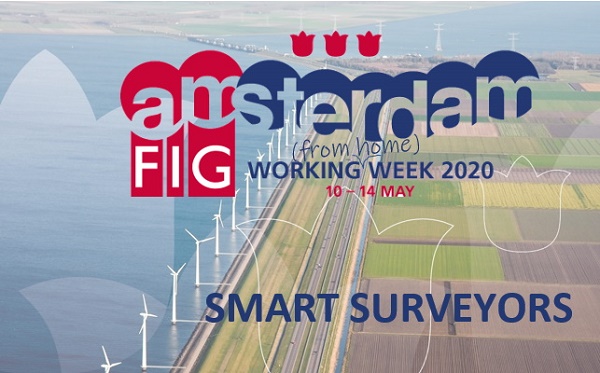
What is a Smart Surveyor? Rapid
urban growth, smart energy, cleaner mobility, and
‘land rights for all’ are some of the challenges
demanding innovative surveying approaches and
technologies. Sensing technologies, spatial data
processing technologies and related approaches are
already available. Use and improve them to become
future proof, Smart Surveyors!
Today's theme of the FIG Working (from home) Week
is Smart
Surveyors. To answer the question "what is a Smart
Surveyor?", the papers of
the
FIG proceedings have been analysed by Tim Brouwer,
Mila Koeva, Peter van Oosterom and Iris Theunisse and in the
first article, the main trends are presented. In the
second article, Leica Geosystems gives you the five
most recent trends in the surveying industry bringing
about the next-generation Smart Surveyor.
The articles are followed by contributions from the
FIG Commissions on
Professional Standards and Practice
(Commission 1),
Professional Education (Commission 2),
Spatial Information Management
(Commission 3) and
FIG Standards Network. The chairs will highlight
for you the hot-topics, the ground breaking research,
and the hidden gems in the proceedings from the their
respective perspectives.
|
|
|
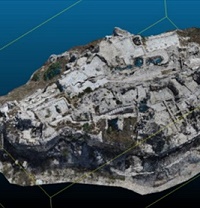
|
Some of the
challenges demanding innovative surveying approaches
and technologies are rapid urban growth, smart energy,
cleaner mobility, and ‘land rights for all’. Sensing
technologies, spatial data processing methods, and
related approaches are already available. However, the
question is how to use and improve them to become
future proof, smart surveyors? Read the article.
|
|
|
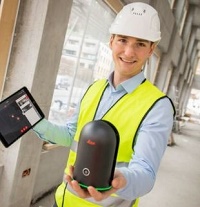
|
Surveyors are a versatile and flexible bunch. As
the current COVID-19 situation has proven, this
group, like others, has had to find new ways of
operating. Even this article is an adjustment.
Originally planned as a presentation, Sensor Fusion
for the Smart Surveyor, for the International
Federation of Surveyors (FIG) Working Week 2020,
adapting to a new platform for information sharing
is becoming the new normal. As surveyors continue to
navigate in these new confines, surveyors will do
what they’ve always had to do – adapt, overcome and
evolve.
Read the
article.
|
|
|
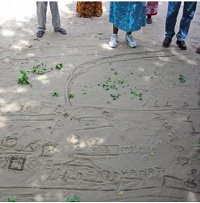
FIG Commission 1:
Professional Standards and Practice
|
Commission 1 focuses on establishing a set of ethical
principles that fits the surveying profession for
reference by professional institutions. It also
focuses on promoting greater understanding and
improving community perceptions about the surveying
profession, which is underlined by the foundation’s
vision to improve gender equality and maintaining
global peace and justice, in line with Goal No. 5 and
16 of the United Nations Sustainable Development Goals
(UNSDG) respectively.
Read the article.
|
|
|
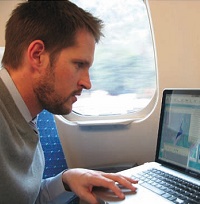
FIG Commission 2:
Professional Education
|
During 2020,
there have been significant developments in surveying
professional education due to the COVID-19
restrictions. Globally, many surveying academic
institutions were required to adapt to these
restrictions by moving their learning and teaching
completely online. This has presented a range of
challenges as we grappled with which learning
management system and video communications platforms
we would use.
Read the article.
|
|
|
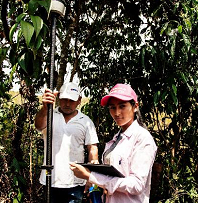
FIG Commission 3:
Spatial Information Management
|
One of the
most impressive examples of how phenomena evolve over
time and space is the spread of the SARS-CoV-2 virus.
Knowing in real time where a local outbreak occurs,
how outbreaks evolve over time, how many people are
affected at any given location is of utmost importance
to take appropriate measures. As with many other
applications, well-established spatial information
management, including an implemented system for
digital information exchange can help to provide the
required spatial information in near real time.
Read the article.
|
|
|
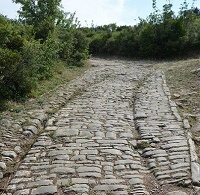
FIG Standards Network
|
A simple
inspection of still-existing Roman roads, aqueducts
and canals shows that the Romans were exceptionally
skilled engineers. Shoe sizes provide a person’s shoe
fitting size. There are many different shoe-size
systems used in the world today. Wi-Fi is a family of
wireless networking technologies, commonly used for
local area networking of devices and Internet access.
Wi-Fi and internet technologies are particularly
important in the situation we find ourselves in today.
But what do Roman roads, shoe sizes and Wi-Fi have to
do with surveying and indeed FIG? Surprisingly they
have a lot in common…
Read the article.
|
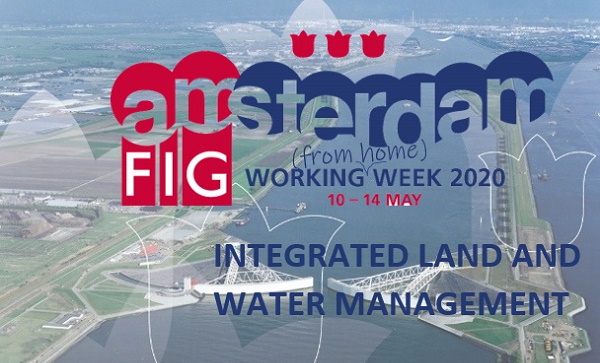
Today's theme of the FIG Working (from home) Week
is
Integrated land and water management. Without
integrated land and water management, the Netherlands
as also other coastal countries cannot sustain its
agricultural and urban development. Climate change increases the risks of sea and
riverine floods and extended drought periods and
complicates this management task. Unorthodox measures
are called for. The
first article, written by Roel Luis, Marije Louwsma,
Roelof Keppel, Rik Wouters, focuses on the Dutch story. The
Netherlands have a long tradition in land and water
management - it all started with dry feet. They still
have dry feet...
The articles are followed by contributions from the
FIG Commissions on
Hydrography
(Commission 4),
Positioning and Measurement (Commission 5),
Engineering Surveys
(Commission 6) and FIG Capacity Development Networks:
Africa and
Asia and the Pacific. The chairs will highlight
for you the hot-topics, the ground breaking research,
and the hidden gems in the proceedings from the their
respective perspectives.
|
|
|
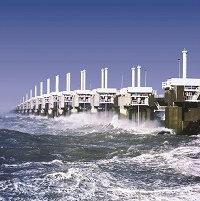
|
It all
started with dry feet. We have a long tradition in the
Netherlands in our fight against water. Our main
purpose for a long time was to make sure that our
dikes and waterworks were strong and high enough to
hold the water. What we have created in the past did a
tremendous job. We still have dry feet.... But
nowadays we take a broader view in water and land
management.
Read the article.
|
|
|
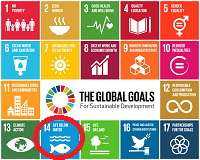
FIG Commission 4:
Hydrography
|
Mapping the
Plastic is a key focus area for Commission 4. The
effects of plastic pollution on the Earth’s oceans
are well documented, potentially catastrophic and
increasing exponentially year on year.
The Blue Economy is another important focus area as
it provides a vital source of food and benefits from
a host of industry sectors, technology and
innovation.
Read the
article.
|
|
|
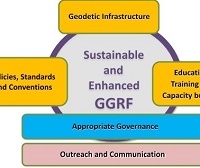
FIG Commission 5:
Positioning and Measurement
|
Seeking to develop the tools, techniques and
procedures necessary to achieve the highest level of
accuracy for a wide variety of surveying disciplines.
Applications are developed and studied that can assist
in all fields of hydrographic and engineering
surveying. These applications also provide the
geospatial detail needed to integrate land and water
management. All of these efforts contribute to work on
realizing five out of the 17 UN Sustainable
Development Goals (SDGs).
Read the article.
|
|
|
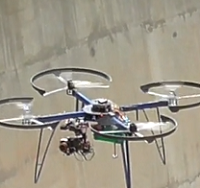
FIG Commission 6:
Engineering Surveys
|
The skills
that engineering surveyors had to acquire in order to
respond to the challenges of the construction world
have made them capable, also, of fulfilling other
challenges, several of which motivated by an awareness
of the limitations of our planet. Engineering
surveyors have learned that they need to push the
equipment and techniques to its limits, while having
recognized the necessity to integrate new techniques
which can present more complete answers, without
forgetting an important qualifier: accuracy.
Read the article.
|
|
|

FIG Africa Capacity Development Network
|
The FIG
Capacity Development Network (CDN) is playing a
leading role in bringing regional member associations
and academic members together using a networking
approach. This is based on enhancing communication in
the region and promoting the ideals of the FIG. Our
Facebook site is the principal platform for
communication. Please LIKE the Facebook page @FIGARN
to stay connected. Read the article.
|
|
|
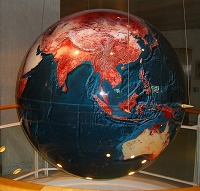
FIG Asia and the Pacific Capacity Development Network
|
The FIG Asia
Pacific Capcity Development Network (AP CDN),
comprises of a group of dedicated individuals from our
Commissions, the corporate sector, academic networks,
and our sister organisations. Our main outcomes
are the development of the technical and soft
capabilities of geodetic surveyors; the modernisation
of a nation's geodetic datum and infrastructure; and
preparing surveyors for the geospatial trends and
challenges that lay ahead.
Read the article.
|
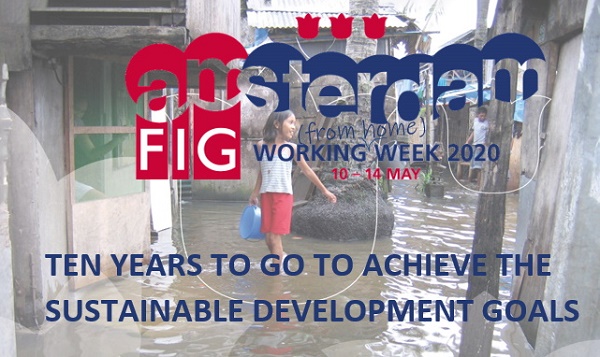
Did you know that...
- 650 million people still live in poverty
- If women farmers have the same access to
resources as men, the number of hungry people can
be reduced up to 150 million
- 70% of the SDG’s are related to
geo–information
The countdown begins, only one decade
to go to accomplish the Sustainable Development Goals
(SDGs). The SDGs are the blueprint to achieve a better
and more sustainable future for all and surveying
professionals have a key role to play. It is therefore
of crucial importance that FIG member organisations
and surveyors are aware and prepared on how their work
contributes to the achievement of the SDGs and vice
versa.
In the first article of today you will
read about
how the FIG community is helping to achieve and
monitor the SDGs and what the role of the surveying
community will be in the coming 10 years.
This article is followed by contributions from the
FIG Commissions on
Cadastre and Land Management
(Commission 7),
Spatial Planning and
Development (Commission 8),
Valuation and the Management of Real Estate
(Commission 9) and
Construction Economics and Management (Commission
10). The chairs will highlight
for you the hot-topics, the ground breaking research,
and the hidden gems in the proceedings from the their
respective perspectives.
Lastly, are you crazy about history? Join us in an
Afternoon of History…
|
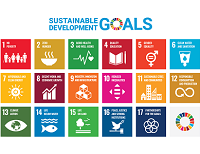
|
The Sustainable Development
Goals (SDGs) and related land indicators will re-shape
and influence our profession profoundly in the decade
to come. It is considered to be of crucial importance
that FIG member organisations and surveyors are aware
and prepared on how their (daily) work contributes to
the achievement of the SDGs and vice versa.
Read the article.
|
|
|
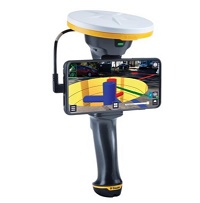 FIG
Commission 7:
Cadastre and Land Management FIG
Commission 7:
Cadastre and Land Management
|
Has your world changed
in the last four weeks? It has for Commission 7
also, and we are adjusting quickly to the new needs
of our world. During this pandemic, every day the COVID19 virus
is changing how we relate to our land from border
closures to restrictions to citizens to be confined
into private parcels. The current pandemic has shown
how important it is to have a land inventory (the
cadastre), and to be able to understand and change
it (hopefully temporally) un terms of rights, restrictions and responsibilities of owners and
occupiers.
Read the
article.
|
|
|
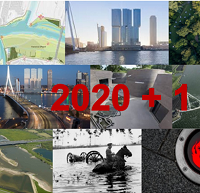 FIG
Commission 8: SSpatial Planning and
Development FIG
Commission 8: SSpatial Planning and
Development
|
From a planners’ perspective it is key to optimize the
spatial allocation of various land use types. This
applies to both land-based and water-based functions
and activities. As such, spatial planning aims to
balance the interests of various policy domains and
stakeholders in pursue of an overall sustainable
development. As land and water are a limited and often
scarce resource, those interests may clash, and
sometimes hard decisions have to be made.
Read the article.
|
|
|
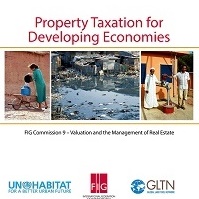
FIG Commission 9:
Valuation and the Management of Real Estate
|
Valuation covers a wide range of assets classes
and purposes. A valuation may be required to
initiate a loan on a single residential home or for
a complex infrastructure project that crosses
international boards or possibly the estimate of
value of a transport vehicle or a
Rembrandt painting. All will require valuation for a
variety of purposes from loan security, insurance,
regulatory and financial reporting. It’s a great and
exciting job being a valuer! Of course, you need
specialist skills for the particular area of
valuation work you are undertaking but the
opportunities are unimaginable.
Read the article.
|
|
|
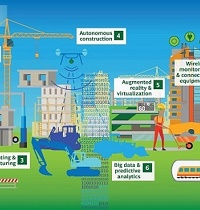
FIG Commission 10:
Construction Economics and Management
|
Global
construction will be critical in countering the
economic effects of the coronavirus. Whilst most
construction has been adversely affected in the short
and medium term by closing sites, social distancing,
material shortages and investment uncertainty, it will
provide an important stimulus to the world economy if
governments enable projects to proceed after the virus
abates. Coupled with this, the crisis is providing a
catalyst for change in the industry in terms of the
greater adoption of technology, consideration of
sustainability and social value impacts, and greater
collaboration.
Read the article.
|
|
|
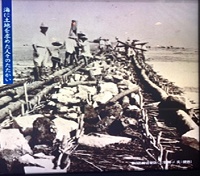
|
Crazy about
history? Join us in an Afternoon of History… This
year, The FIG Permanent Institution of History of
Surveying joint forces with De Hollandse Circle to put
together a programme for an afternoon of history
during the FIG Working Week. In this article we have
highlighted a few of the papers that are related
particularly to the history of Dutch Surveyors and
Dutch Surveying which takes you all the way to Japan.
Read the article.
|
Follow up...
Yesterday's theme
Integrated land
and water management calls for a celebration of
the 8th anniversary of the adoption of the Voluntary
Guidelines on the Responsible Governance of Tenure of
Land, Fisheries and Forests. Please enjoy this short
video from UN-Food and Agriculture Organisation (FAO).
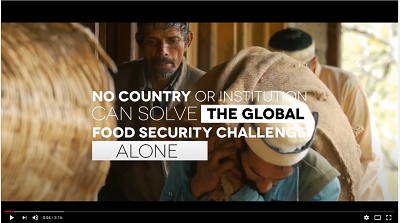
FIG values the cooperation with FAO. During the FIG
Working Week 3 sessions had been planned. These
sessions are part of larger joint activities, and the
Working Week is an excellent place to bring experts
together.
Two
webinars will be held during these coming months, so
please look out for announcement of this. Planned
sessions were:
-
TS01I: Land Consolidation Legislation: FAO
Legal Guide and its Application at the Country
Level
-
TS02I: The Role of Land Consolidation and
Other Land Management Instruments in Development
of Agricultural Land Markets – in cooperation with
FIG Commission 8 on – Spatial Planning and
Development
-
In cooperation with FIG Commission 2, the FIG
Academic Forum on VGGT - VGGT and the UN
Convention to Combat Desertification into the
implementation of the Convention,TS03A
|
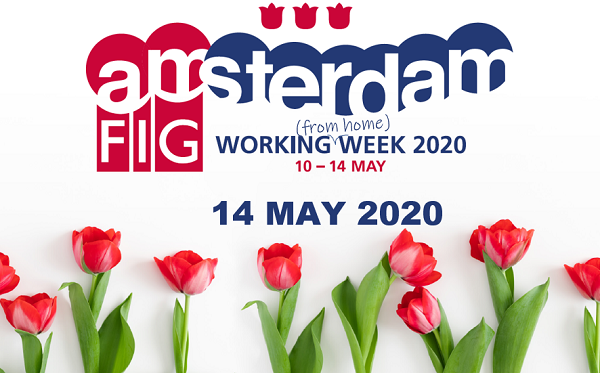 What's next?
It is Thursday 14 May 2020, and today should
have been the closing day of FIG Working Week in
Amsterdam. The programme of today would be the second
General Assembly session and closing and handover
ceremony.
How is it possible to hand over to yourself…
This will be the case this year since the FIG Flag
should be handed over from the local organisers 2020
to the local organisers 2021! So instead the Local
Organising Committee created a message for you, where
each LOC member is symbolically handing over (from
home!) to welcoming you next year.
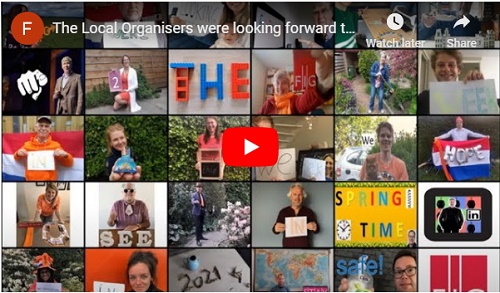
We would like to extend a thank you to all
who have followed us during this week.
Please enjoy the articles of this final and closing
day of FIG Working Week 2020
|
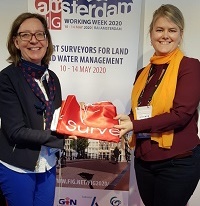
Informal 'hand over' at Intergeo, Stuttgart
|
This week we gave you a front row seat to the
content of the FIG Working Week. The Local
Organising Committee of FIG2020 and FIG found an
alternative way to make sure you could get easy
access to the proceedings. It was a way to recognise
all the hard work of the authors and presenters. But
it also turned out to be a way to feel connected to
the FIG community, to show that we as community
continue, not matter what, reach out to each other
and are interested to learn what the latest
developments are. Knowledge, cooperation and
improving our profession is what drives us.
Read the article. |
|

 |
As one of the founding partners of the
Global Land Tool Network (GLTN), FIG has
contributed to the development of land tools
with GLTN since 2006. Over the years and since 2006, FIG has been involved
in the development of many of these tools. Today,
the tools are successfully used in many projects at
a local, national and regional level.
Read the article. |
|
 |
It has
been different for us to present a full Working Week
in 6 Newsletters and 24 written articles, but we hope
that you have enjoyed this journey with us from home.
A very big thanks to all who have contributed to all
articles, and also to the current Local Organising
Committee for their preparations so far. All
the articles. |
|
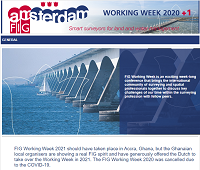 |
Follow the preparations for next year's FIG
Working Week at
www.fig.net/fig2021
What can you expect at the FIG Working Week
in 2021? Wait and see... For both FIG and
LOC it is most important that we create an
opportunity where our community can meet.
|
|
|
|
|
Dutch Local Organising Committee, FIG and GIM Magazine
Thank you to our sponsors and supporters,
we really do appreciate you being part - from
the distance - of the
FIG Working Week 2020!
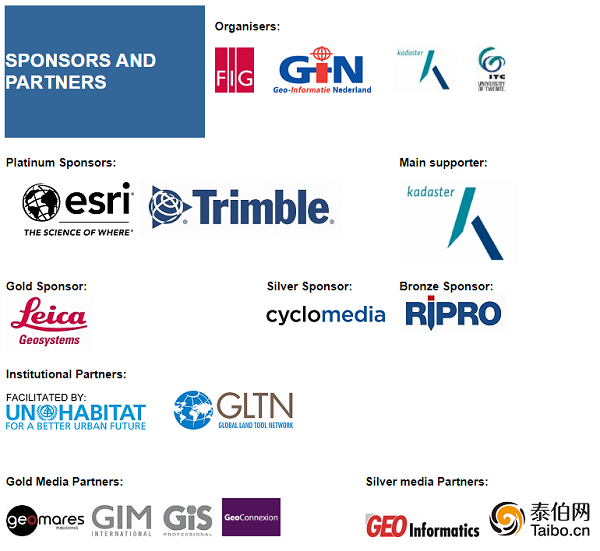
Louise Friis-Hansen
4 May 2020























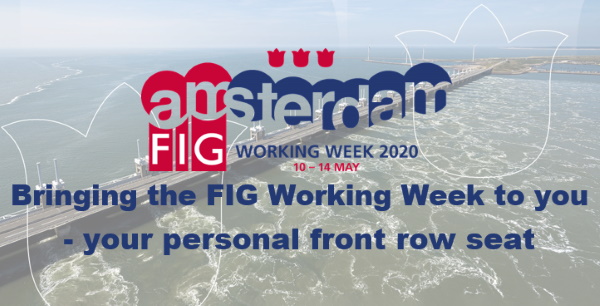
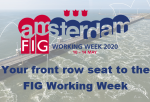





























 FIG
Commission 7:
FIG
Commission 7:
 FIG
Commission 8:
FIG
Commission 8: 










